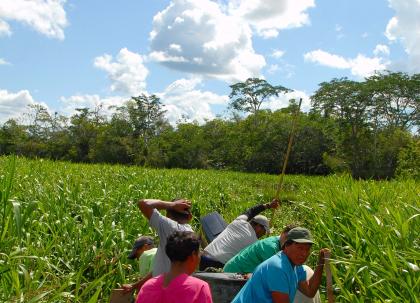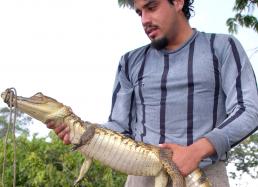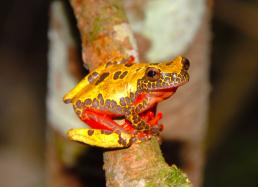3. Pushing & Pulling Canoes
Why are we in this remote corner of the Amazon, the Güeppí-Cuyabeno region? We were invited by INRENA, the national park service in Peru (now known as SERNANP), and the Cofan indigenous group in Ecuador. INRENA administers the Zona Reservada Güeppí in Peru, an area temporarily set aside for conservation but still awaiting an official category. And the Cofan people are stewards within Cuyabeno, a well-established wildlife reserve that receives little international attention as it is situated in one of the more remote corners of Ecuador.
Both INRENA and the Cofan asked us to conduct the inventory to bring attention to the region. As a team, we were thrilled to spend time in this remote corner of the Amazon, especially within the “sea of green,” an intact forest that stretches for hundreds of kilometers, where so many regional floras and faunas intersect.
Right now, our entire team is in the boat, headed from the Cofan community of Zabalo upriver to our first camp at Garzacocha. We have seventeen scientists from the U.S., Ecuador, and Peru, a dozen of our Cofan and Secoya indigenous colleagues, and a ton of food and gear, all packed into three large canoes.
Although we're allegedly traveling up the Lagartococha River, we're actually coursing through a giant lake complex and subject to its shifting dynamics. On our way to Garzacocha, our canoes got stuck in a massive floating weed island. Just a week earlier, there was free passage, but the river has dropped more than a meter and a half! Now we're all out of the canoe, some pushing the boat in neck-deep water, others pulling the boat from shore using a rope tied to the prow (see above photo.)
After about an hour of pushing and pulling, we're free of the weeds. In all, it takes us seven-and-a-half hours to reach Garzacocha from Zabalo. As we left the whitewaters of the Aguarico River, we saw the flora turn over almost completely (~95%) with the transition to the blackwaters of the Lagartococha River.
We're now camped out along a blackwater lake, night is falling (see the awesome sunset in Photo #2 below), and everyone has staked out their tents or hung up their hammocks. (Take a look at my fabulous sleeping quarters in my “Video Journal 1: “Hammock Home.”) The herpetologists are already out looking for frogs and snakes (find out how they collect at night in their “Video Journal 4: Snakes!”) Botanists are pressing the plants they collected during the boat ride and around the lakefront near camp.
Everyone is excited for tomorrow. The ornithologists and mammalogists will be up the earliest, headed into the field before first light. Botanists and ichthyologists will leave after dawn, eating breakfast and tromping off into the forest with their collecting gear and a can of tuna and some crackers.Typically, the herpetologists are out collecting until 2 or 3 in the morning, and only emerge late morning once it gets too hot in their tents. (Check out Photos #3 and #4 below to see what they found at our first site).
Everyone will meet up again tonight at dinner, each with their own wild tales of the most interesting findings of the day. Looking forward to this evening’s “jungle stories”…!
Corine
Written October 5, 2007







